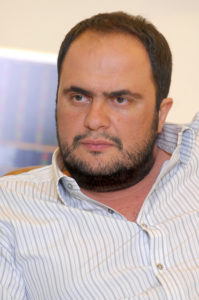
Yet another setback for the state of European sports: after FIFA rejected repeated calls to make available the infamous Garcia report documenting the way Qatar won the bid to host the 2022 World Cup, a major Greek football official was rushed to the hospital after being pommeled with iron bars by unidentified assailants. It seems that not another day passes by without new revelations into the increasingly opportunistic world of sports and the declining moral quality of those who are charged to oversee it.
Greece is probably the most poignant example of a sports environment that is fraying at its seams, crushed under the overbearing weight of shady interests and scandalous stories. Christoforos Zografos, the target of November 15th “murderous attack”, is the assistant director of the central refereeing committee of the Hellenic Football Federation (HFF). Making matters worse, his boss, accolade-addled Scotsman and former referee of the 1998 and 2002 World Cup finals, Hugh Dallas, was forced to step down from his post as President of the refereeing committee, where he was charged with appointing officials for matches, and will instead stay on as Head of Training. This earthquake in Greek sports prompted the HFF to suspend football matches indefinitely, especially since with the two men out, no senior official is overseeing the referee nomination process.
Comments made by Evangelos Marinakis, president of top-flight team Olympiacos, who blamed archrival and AEK Athens strongman Dimitris Melissanidis for orchestrating the attack, further galvanized the scandal. Marinakis said that he held conclusive evidence that could indict Melissanidis. As a result, both men, along with the head of the Hellenic Football Federation (HFF), Giorgos Sarris, were summoned by newly appointed sports prosecutor Constantinos Simitzoglou to testify.
Dallas’ demotion marks a new low in the troubles plaguing Greek football. Initially brought on in June to cleanse the image of a sport that became synonymous with corruption, illegal gambling and match fixing after a 2011 scandal laid bare the web of collusion between money, power, media and the police, the Scotsman wasn’t able to wash away the memories of the so-called Koriopolis affair.
When the scandal broke, Marinakis held center stage. Charges of match fixing, bribery and violence were brought against him, but he managed to skirt justice in spite of the evidence pointing to his direct involvement in the affair as ringleader. According to telephone recordings released earlier this year, Marinakis used his influence within the main Greek sports bodies to secure the appointment of favorable referees.
It is ironic to see how one of the main actors involved in the declining quality of Greek football, which prompted the Federation to take on Hugh Dallas in the first place, is now fashioning himself as the main defender of fair play. However, knowing the historic rivalry between Olympiacos and AEK Athens, his accusations are to be taken with a grain of salt. In his outrage at the accusation, Melissanidis, speaking to leading Greek newspaper Ekathimerini, said that “those who are accused of blackmailing, bribing, beatings and explosions, and who have ignored any value of healthy competition by undermining soccer in our country, have the cheek to speak about morality, values and progress”, in a thinly veiled reference to Marinakis.
Looking at the recent history of anti-corruption efforts in Greek football, I am inclined to think that after the initial brouhaha surrounding the Dallas and Zografos incident simmers down, the cogs underpinning the Greek football industry will go back to their usual motions. In spite of media pressure, lives lost, careers destroyed or “minor” considerations of football as a sport based first and foremost on moral values, neither the government nor the League are likely to revisit their ways, given their previous failures to force a change on the industry.
Just like FIFA’s dismissive attitude towards the legitimate concerns raised over the World Cup attribution process, the Greek football oligarchy seems to operate in a space that is outside the reach of the law, the state, the public or even common sense. Indeed, football is more than just a game – to some it’s even a religion. But the current practitioners are starting to look more and more like apostates.

